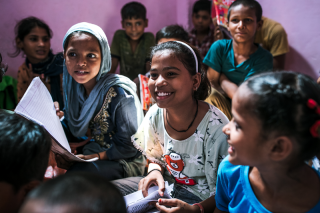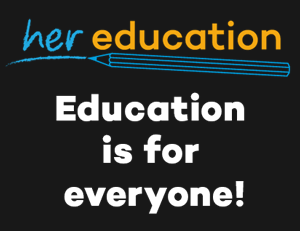
Learning, not working
Mantasha’s sisters work to support their family, but she is changing the story
Mantasha, 12, has had a difficult childhood. Her mother sadly died of tuberculosis when Mantasha was just six-years-old and her father was left disabled and unable to work after he also contracted the same disease. The family soon moved to Delhi because Mantasha’s aunt lives there and her father was hoping she could help to support his children.
Mantasha has two older sisters who are both working in garment factories to support the family. She also has two other younger sisters who live at home. The family is completely reliant on Mantasha’s sisters and she doesn’t get to see them very much as they work late. She says: “If my sisters are not working, there is no food at home.”
Sadly, the story of girls working instead of learning is all too familiar; 129 million girls are out of school across the world and we are working hard to provide equal opportunities to children in the countries where we work. Girls make up 50% of the children we feed across our global programme, which is especially important as according to UNICEF, only 49% of countries have an even gender split in primary education. We are striving to offer girls the chance to one day grow up well-nourished and well-educated, to become the women who will lift their communities out of poverty.
After Mantasha’s family moved to Delhi to be closer to her aunt, she was provided with an opportunity to start learning. Unable to enrol in a government school because the family had no internal immigration papers, Mantasha enrolled at Gyaan Sarovar, an informal school in Bhalswa Dairy, the slum area where the family now lives. Mantasha doesn’t live very near to the school building, which sits behind the enormous rubbish dump, where many of the families here work. But Gyaan Sarovar School also runs informal classrooms around the slum, to enable as many children as possible to access an education. In small rooms in tiny buildings throughout this neighbourhood, children are learning.

Mary’s Meals supports Gyaan Sarovar School by providing a hot, nutritious meal each school day for every student. And those children who are studying in the classrooms around the slum are not left out. Food is cooked in the school kitchen and then transported by motorbike to the satellite classrooms. At first, she was not used to eating good portions of food. The 11-year-old says: “I could only eat small portions at first. But then I started to see the value of having nutrition and I could see the difference it was making for me in class.”
Sometimes, Mantasha worries that she, like her sisters, will have to work, but the provision of Mary’s Meals makes it much more likely that she can stay on in school, because her family knows that her meal is covered.
School has been life-changing for Mantasha, who is beginning to dream about the prospect of facilitating change for future generations of girls just like her. She says: “Only after I came here did I start to feel hope that I could be educated. I want to be a teacher and give the same hope to other children. My dream is to build a school and then teach there.”
By supporting our work, you can make sure that girls like Mantasha have access to a life-changing education in a classroom where they belong, instead of working at a job they are far too young for. Your help ensures that girls across the 16 countries in which we work will not become a statistic and that together we can build towards a day where every girl can attend school and look forward to the prospect of a brighter future.


